Overview
Managing Type 2 diabetes can feel overwhelming, but effective interventions are here to support you. Lifestyle changes, medication, education, and community support work together to improve health outcomes and empower you to take charge of your condition. It's understandable to feel uncertain, but know that you are not alone in this journey.
The article highlights various strategies, including:
- The Diabetes Prevention Program
- The American Diabetes Association's guidelines
These resources show that a combination of personalized care, structured support, and community engagement leads to better self-management and reduced complications. Remember, we are here to support you every step of the way.
Consider reaching out to local support groups or healthcare providers who can offer guidance tailored to your needs. Sharing your experiences with others can also foster a sense of community and understanding. Together, we can navigate this path toward better health.
Introduction
Navigating the complexities of Type 2 Diabetes can often feel overwhelming. With countless interventions and strategies vying for your attention, it’s understandable to feel lost. As the prevalence of this condition continues to rise, understanding the most effective management techniques becomes crucial for improving health outcomes. This article delves into nine impactful interventions that empower you to take charge of your diabetes. It also highlights the importance of community support and education.
How can these diverse strategies transform the lives of those affected by Type 2 Diabetes? What role does personal commitment play in achieving lasting health improvements? You're not alone in this journey, and we are here to support you every step of the way.
T2DSolutions: Comprehensive Resource for Type 2 Diabetes Management
T2DSolutions is a vital resource for individuals managing Type 2 Diabetes, offering a comprehensive range of interventions for type 2 diabetes tailored to your unique needs. Here, you will find practical insights, including dietary plans and exercise routines, designed to simplify the challenges of overseeing your health. By focusing on education and community support, T2DSolutions empowers you with the essential tools for effective self-management. This approach not only promotes resilience but also fosters a sense of belonging among individuals and families, reinforcing the idea that navigating health conditions is a shared journey.
Effective education programs, such as the CP-HELP intervention, serve as important interventions for type 2 diabetes, demonstrating significant improvements in self-care practices and blood glucose levels. These findings highlight the positive impact of organized support. Additionally, community engagement is crucial for better health outcomes; studies show that participants in community health worker programs have lower odds of emergency department visits and improved A1C levels. T2DSolutions not only enhances your understanding of blood sugar control but also creates a nurturing environment where shared experiences and knowledge lead to better health outcomes.
You're not alone in this journey—T2DSolutions is here to support you every step of the way. Together, we can navigate the complexities of managing interventions for type 2 diabetes.
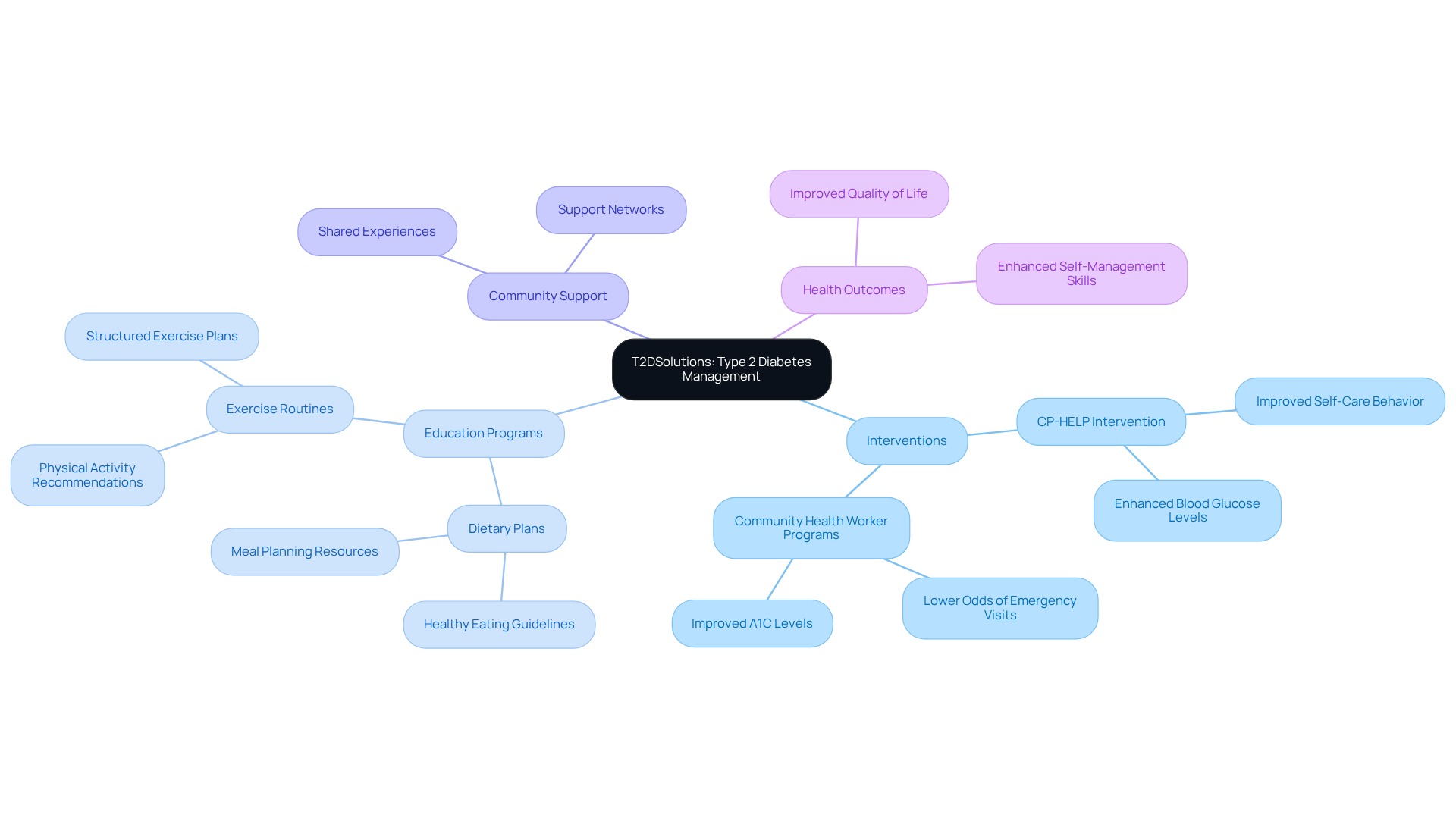
American Diabetes Association: Evidence-Based Guidelines for Diabetes Management
The American Diabetes Association (ADA) provides essential evidence-based guidelines that are critical for effective interventions for type 2 diabetes care. These guidelines cover important areas such as nutrition, physical activity, and medication management, empowering individuals to make informed choices about interventions for type 2 diabetes that can significantly enhance their health outcomes. Recent updates to the ADA recommendations highlight the importance of personalized care, advocating for tailored interventions for type 2 diabetes that take into account specific health goals and conditions.
Key recommendations suggest that interventions for type 2 diabetes should include starting or increasing insulin and other glucose-reducing treatments for most noncritically ill patients, aiming for a target glycemic goal of 100-180 mg/dL (5.6-10.0 mmol/L). Moreover, the ADA underscores the significance of consistent diabetes self-management education, which involves interventions for type 2 diabetes, ensuring that all individuals with diabetes actively engage in their care. This education is designed to be culturally appropriate and responsive, which enhances its effectiveness in the context of interventions for type 2 diabetes.
Real-world examples illustrate the positive impact of interventions for type 2 diabetes on health outcomes. For instance, individuals who adhere to the ADA's dietary guidelines and maintain a consistent exercise routine can benefit from interventions for type 2 diabetes, reporting improved glycemic control and a reduced risk of complications. Additionally, the ADA's focus on community involvement fosters resilience by encouraging individuals to share their experiences and strategies for managing their condition, which can lead to effective interventions for type 2 diabetes.
By utilizing the ADA's comprehensive resources, individuals can gain a clearer understanding of their condition and the crucial role of regular monitoring in implementing effective interventions for type 2 diabetes to maintain optimal health. The ADA's commitment to evidence-based practices not only empowers patients but also enhances the overall quality of care through targeted interventions for type 2 diabetes. Furthermore, the ADA encourages individuals with excess weight or obesity to aim for a weight reduction of at least 3-7%, as this is vital for effective blood sugar control and is a key component of interventions for type 2 diabetes. The financial burden of this condition is substantial, with total yearly expenses reaching $412.9 billion in 2022, highlighting the need for effective interventions for type 2 diabetes. As T2DSolutions launches as a new resource hub, it will provide access to these ADA guidelines and assist newly diagnosed patients in navigating their journey toward better health through interventions for type 2 diabetes.
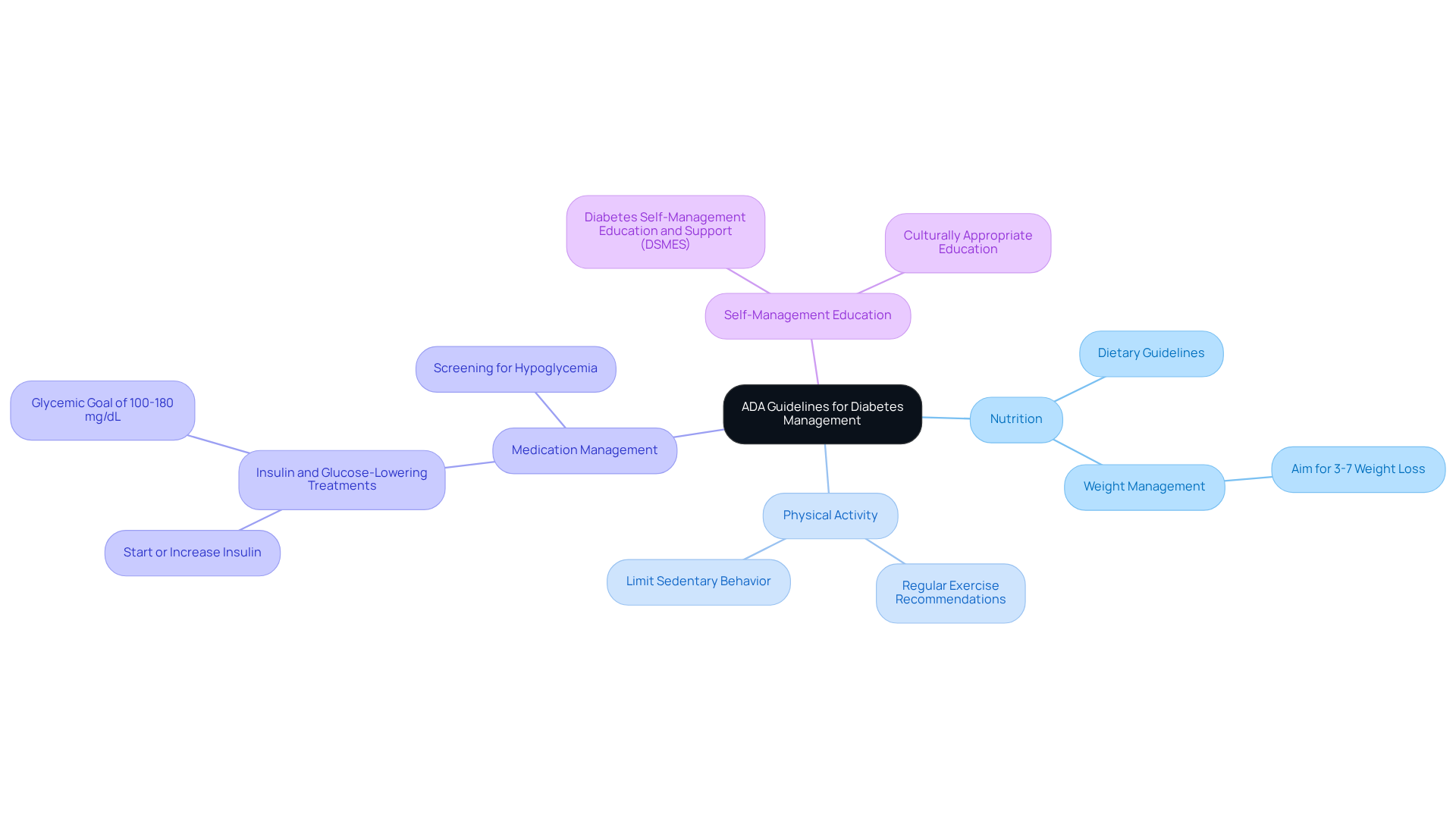
Diabetes Prevention Program (DPP): Lifestyle Change Intervention for Diabetes Prevention
The Diabetes Prevention Program (DPP) offers a structured lifestyle change intervention aimed at providing interventions for type 2 diabetes in individuals at high risk. This program emphasizes weight loss through dietary modifications and increased physical activity, which are crucial steps in your journey toward better health.
With the support of trained lifestyle coaches, participants find accountability and motivation, making this process feel less daunting. It’s important to know that evidence shows individuals who complete the DPP experience significant reductions in their risk of developing diabetes-related conditions. For example, participants in the DPP achieved an average weight loss of 5.6 kg, while control groups only saw a modest 0.1 kg loss. This clearly highlights the program's effectiveness.
Moreover, lifestyle changes akin to those promoted in the DPP have been shown to lower the occurrence of diabetes-related conditions by 58% among participants over a follow-up period of 2.8 years. This structured approach not only encourages healthier habits but also leads to tangible outcomes, such as better insulin sensitivity and lower fasting plasma glucose levels.
Experts agree that lifestyle modifications are essential interventions for type 2 diabetes, with numerous studies supporting the effectiveness of these interventions for high-risk groups. By focusing on weight control and physical activity, the DPP serves as a vital resource for individuals seeking interventions for type 2 diabetes to prevent its onset.
At T2DSolutions, we are committed to enhancing this initiative by providing extensive resources and support for those recently diagnosed. Remember, you’re not alone in this journey. We ensure you have access to the tools you need for effective health oversight, guiding you every step of the way.
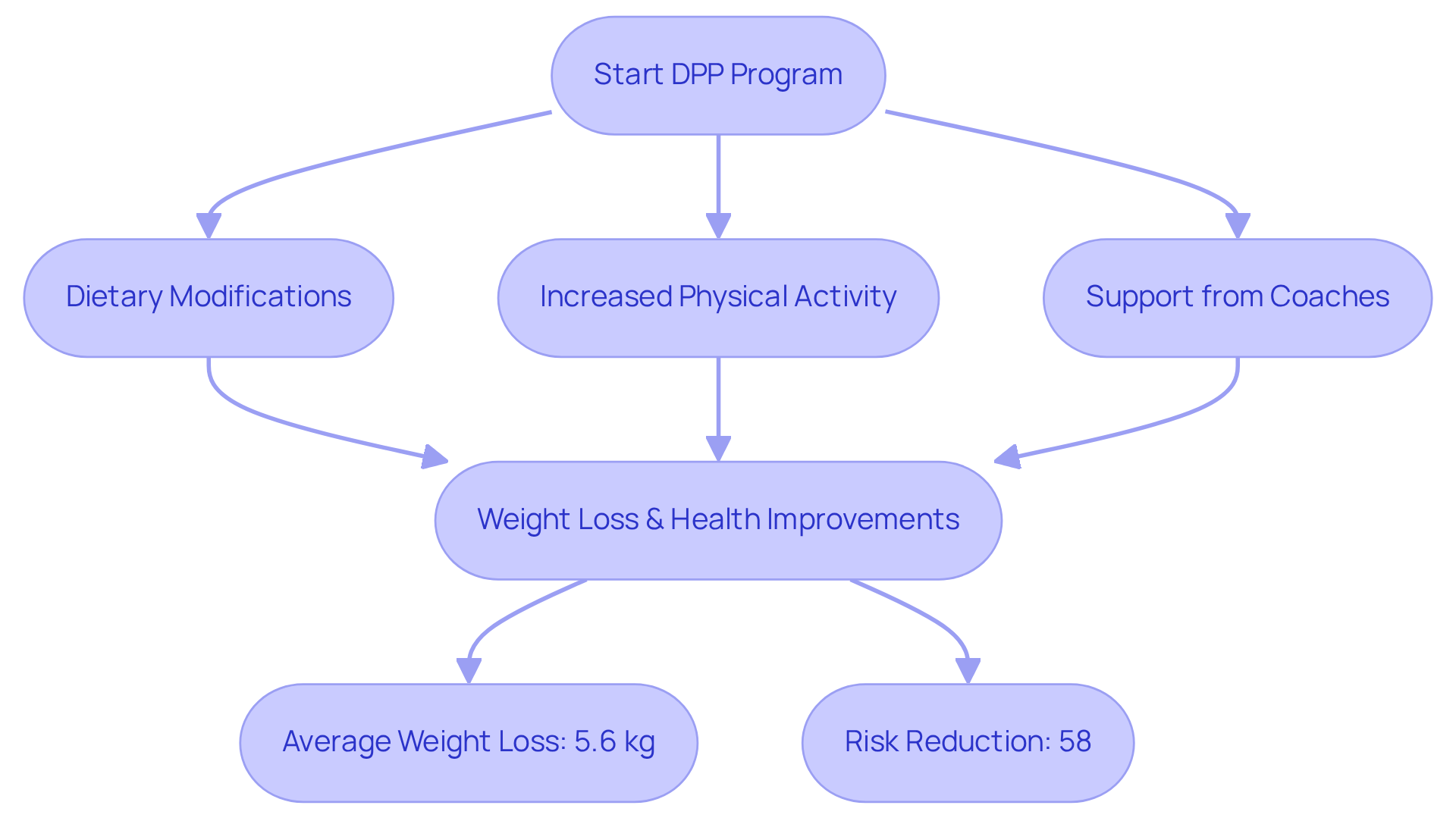
Look AHEAD Study: Long-Term Lifestyle Intervention for Weight Loss and Diabetes Control
The Look AHEAD (Action for Health in Diabetes) study stands as a pivotal clinical trial that explored the effects of long-term lifestyle changes on weight loss and blood sugar control. Involving 5,145 overweight or obese participants with Type 2 Diabetes, this study implemented a comprehensive program encompassing dietary counseling, structured physical activity, and behavioral strategies. Over the course of the trial, participants in the intensive lifestyle intervention (ILI) group experienced an average weight loss of 4.7% of their initial body weight by year 8, with 50.3% of them losing at least 5% of their initial weight. This significant weight loss was associated with improved glycemic control and a reduction in cardiovascular risk factors, highlighting the essential role of ongoing lifestyle modifications in managing blood sugar challenges.
It's understandable to feel a mix of hope and concern when considering such changes. Despite these positive outcomes, the research also indicated that intensive lifestyle interventions did not significantly reduce the incidence of negative cardiovascular events. This finding underscores the importance of a comprehensive strategy that includes continuous support and lifestyle changes.
The insights from Look AHEAD reinforce the necessity of integrating long-term lifestyle changes into care strategies, particularly interventions for type 2 diabetes, to enhance overall health outcomes. At T2DSolutions, we are here to support newly diagnosed patients in implementing these lifestyle changes through educational resources and community support. Remember, you're not alone in this journey; we are here to assist you every step of the way.
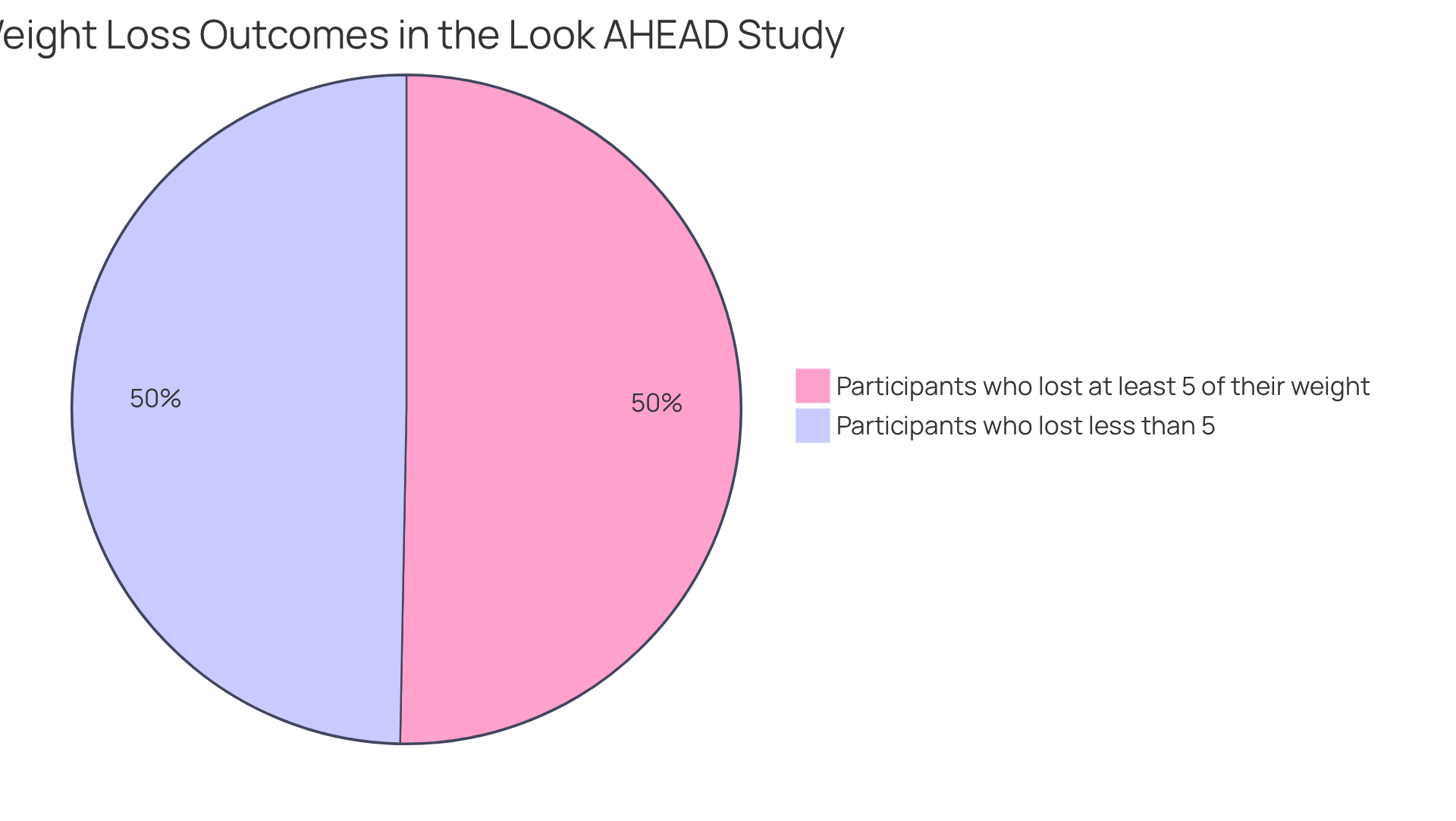
NIDDK: Research and Resources for Diabetes Prevention and Management
The National Institute of Diabetes and Digestive and Kidney Diseases (NIDDK) is here to support you in understanding blood sugar regulation and management. In 2021, approximately 38.4 million individuals in the U.S. were identified with diabetes, alongside an additional 97.6 million adults facing prediabetes. This highlights the importance of NIDDK's research and resources in addressing this significant public health concern. Through their extensive research, the NIDDK is dedicated to enhancing our understanding of diabetes and its complications, which can greatly influence care outcomes for individuals like you.
Their website offers a wealth of educational resources, including:
- Detailed guidelines for blood sugar control
- Insights into ongoing clinical trials
- Tailored materials for healthcare providers
By utilizing NIDDK resources, you can empower yourself to make informed choices about your care, ultimately leading to better health outcomes. T2DSolutions advocates for a holistic approach to blood sugar management, emphasizing lifestyle changes and mental health support, which aligns beautifully with the NIDDK's mission to improve patient care.
It's important to recognize that 'Diabetes is the primary reason for new instances of blindness in adults aged 18-64 years.' This statistic underscores the critical need for effective strategies. You're not alone in this journey; we are here to support you every step of the way. Consider reaching out to the resources available to you, as they can make a significant difference in your health and well-being.
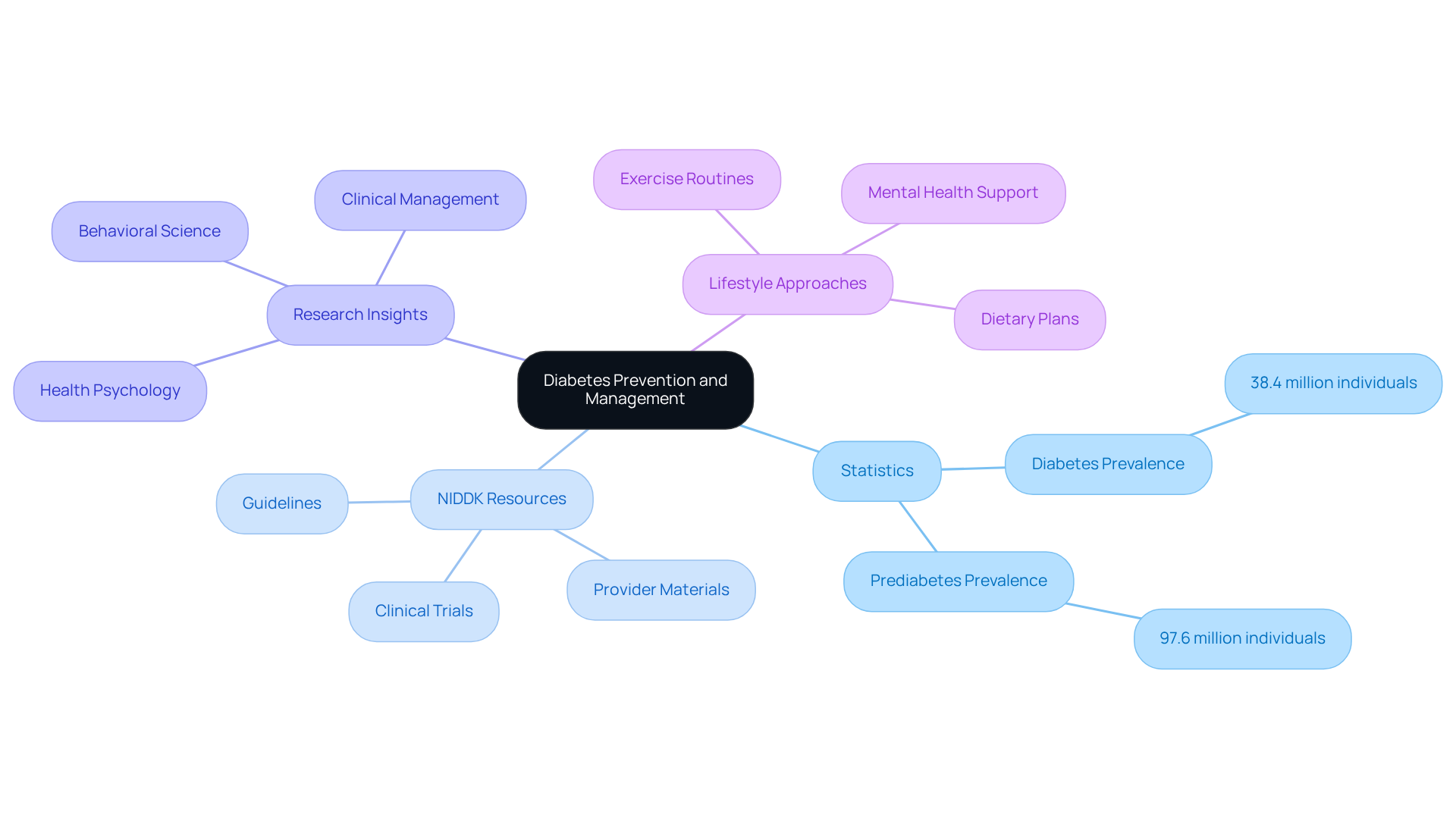
CDC: Diabetes Prevention Programs and Community Resources
The Centers for Disease Control and Prevention (CDC) plays a crucial role in providing a range of programs aimed at preventing diabetes, including interventions for type 2 diabetes, and offering community resources that can significantly reduce its incidence. These initiatives serve as interventions for type 2 diabetes by focusing on lifestyle changes, such as healthy eating and increased physical activity, and are often implemented in community settings to ensure everyone has access. It's understandable to feel uncertain about these changes, but know that the CDC also equips healthcare professionals with essential resources to employ effective prevention strategies. This comprehensive approach is designed to help you navigate your health journey with confidence.
By engaging with community resources, you can strengthen your support network, creating an environment that fosters cooperation and enhances your ability to manage your condition effectively. Remember, you're not alone in this journey. There are people and resources ready to support you every step of the way. If you ever feel overwhelmed, reach out for help or share your experiences with others. Together, we can build a healthier future.
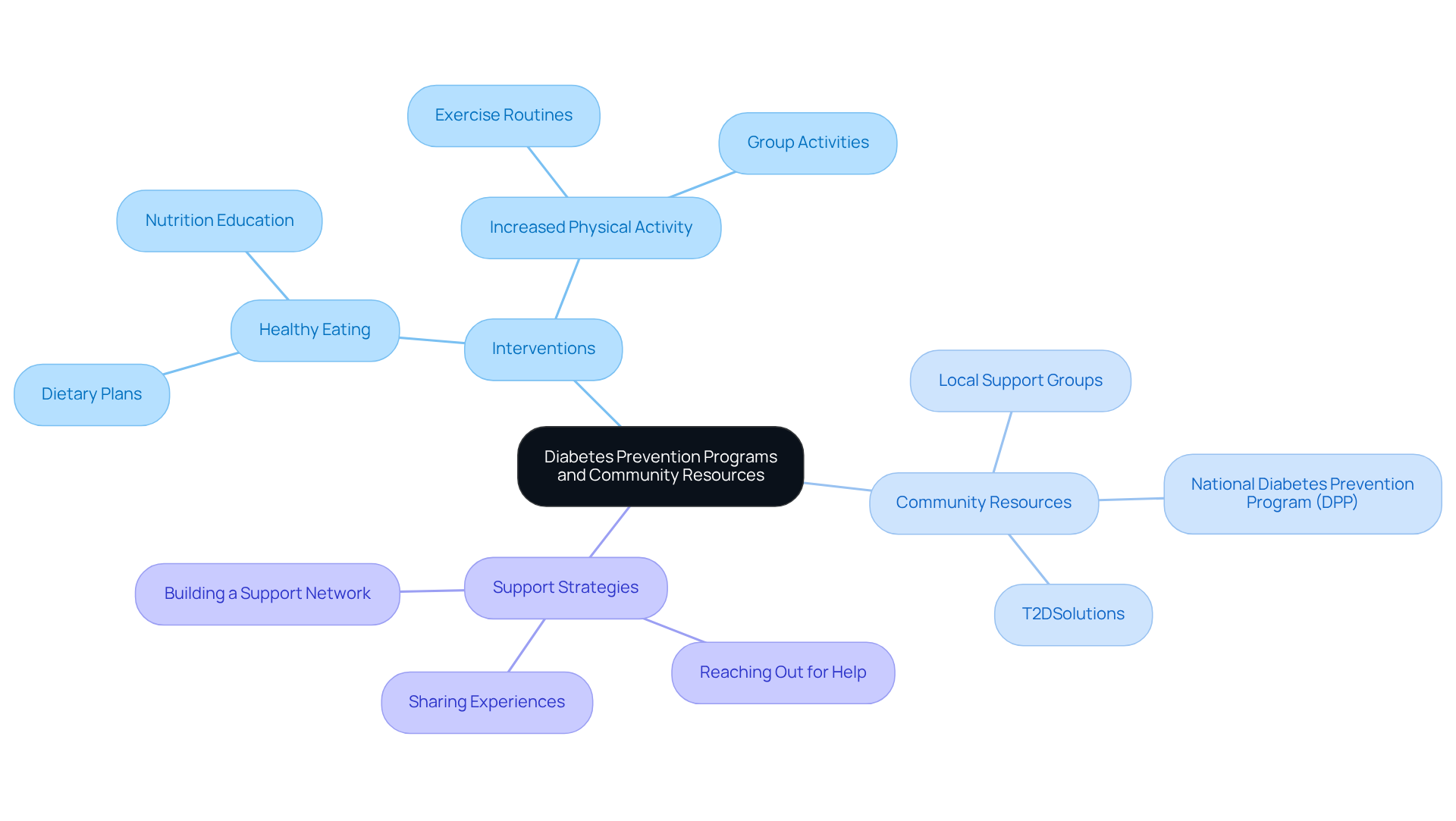
Diabetes Self-Management Education and Support (DSMES): Empowering Patients for Better Control
Diabetes Self-Management Education and Support (DSMES) programs provide essential interventions for type 2 diabetes, empowering individuals with the knowledge and skills necessary for effective diabetes care. These programs cover a wide range of subjects, including:
- Blood glucose monitoring
- Medication oversight
- Healthy lifestyle choices
By engaging in DSMES, you can create personalized management plans tailored to your unique needs, significantly enhancing your confidence in managing your condition.
It's understandable to feel overwhelmed at times, but this empowerment is vital for achieving long-term health objectives. Studies indicate that fewer than 7% of individuals utilize these educational resources within the first year of their diagnosis. However, effective self-management education for blood sugar regulation has been associated with improved health results and is essential for interventions for type 2 diabetes, decreasing the chances of complications and hospital admissions.
As T2DSolutions launches as a comprehensive resource hub for education on managing diabetes, it will provide access to interventions for type 2 diabetes, including DSMES programs. This ensures that you have the support you need to handle your condition effectively. Remember, you are not alone in this journey. Promoting patient empowerment through education is crucial for improved management and overall quality of life. We are here to support you every step of the way.
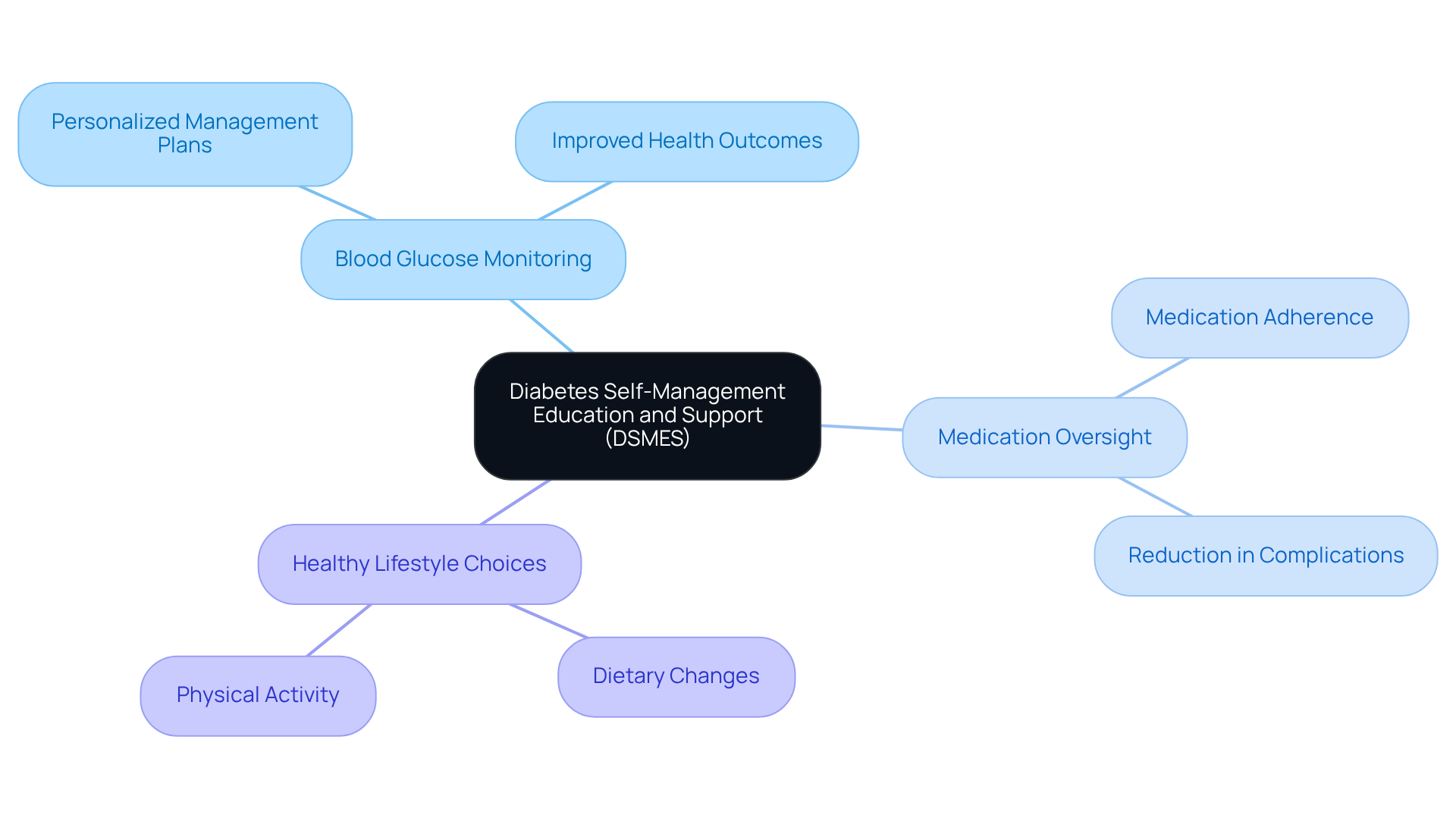
Metformin: A Key Pharmaceutical Intervention for Type 2 Diabetes Management
Metformin is often the first medication recommended for individuals diagnosed with Type 2 Diabetes, and for good reason. It works by improving insulin sensitivity and reducing glucose production in the liver, making it a vital part of managing blood sugar levels. Extensive research shows that Metformin can significantly lower blood sugar levels, with studies indicating a remarkable 31% decrease in the progression of diabetes compared to placebo. Additionally, it offers cardiovascular benefits, contributing to better overall health outcomes.
Understanding how Metformin works and being aware of potential side effects is essential for anyone taking it. While it is generally well-tolerated, long-term use can lead to gastrointestinal symptoms and vitamin B12 deficiency, which is why regular monitoring is important. It's understandable to feel concerned about adherence; real-world experiences show that initial adherence rates to Metformin hover around 72%, but this can decline over time.
Experts emphasize the value of interventions for type 2 diabetes, including Metformin, as a cost-effective option for diabetes prevention, especially for individuals with prediabetes and specific risk factors, such as a BMI of 35 kg/m² or higher. The American Diabetes Association recommends Metformin therapy for these individuals. However, despite its proven benefits, only 3.7% of people with prediabetes have been prescribed Metformin in recent studies. This gap highlights the need for better education and communication between patients and healthcare providers about the importance of interventions for type 2 diabetes, including Metformin.
At T2DSolutions, we are here to support you on your journey. We offer resources and assistance for patients managing their condition, and our educational materials and community support can help you understand how to use Metformin and explore other treatment options effectively. You're not alone in this journey; we encourage you to visit T2DSolutions for more information on managing your blood sugar levels with Metformin.
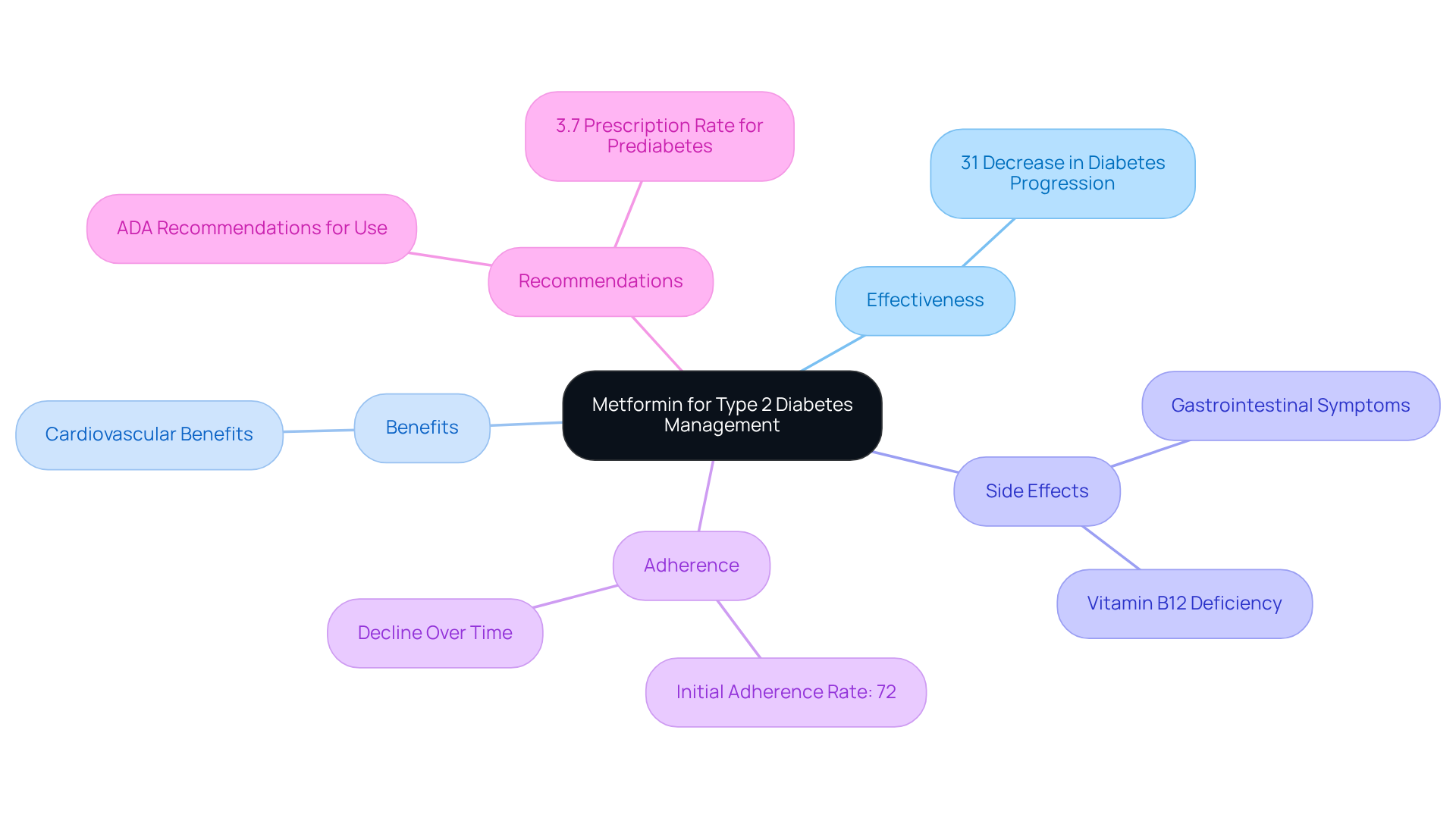
Bariatric Surgery: Surgical Intervention for Type 2 Diabetes in Obese Patients
Bariatric surgery represents a transformative option for individuals grappling with obesity and seeking interventions for type 2 diabetes, often leading to significant weight loss and improved blood sugar management. Procedures such as Roux-en-Y gastric bypass and sleeve gastrectomy have demonstrated remarkable success, with nearly 80% of patients experiencing remission after surgery. These surgical alternatives are typically recommended for those who have struggled to achieve satisfactory results through lifestyle changes and medications.
At T2DSolutions, we are dedicated to being a comprehensive resource for managing blood sugar levels, including information on surgical options like bariatric surgery. Generally, current eligibility criteria for bariatric surgery in individuals with diabetes-related conditions include:
- A body mass index (BMI) of 35 or higher, or
- A BMI of 30 with obesity-related health issues.
Furthermore, candidates should have a history of unsuccessful weight loss attempts through non-surgical methods. It’s essential to undergo a thorough evaluation by healthcare professionals to determine the most appropriate surgical approach tailored to individual health profiles.
Real-life success stories reveal the profound impact these procedures can have. Many individuals share experiences of significant improvements in their blood sugar control within weeks of surgery, with some achieving complete remission. Recent studies reinforce these findings, indicating that metabolic surgery is one of the promising interventions for type 2 diabetes, as it aids in weight loss, stabilizes blood sugar levels, reduces the need for diabetes medications, and enhances overall quality of life.
As the field of bariatric surgery continues to advance, ongoing research and clinical trials are vital to further validate its effectiveness and refine eligibility criteria, ensuring that more patients can access this life-changing intervention. We encourage you to explore the blood sugar control options available through T2DSolutions and connect with our community for support and resources. Remember, you're not alone in this journey; we are here to support you every step of the way.
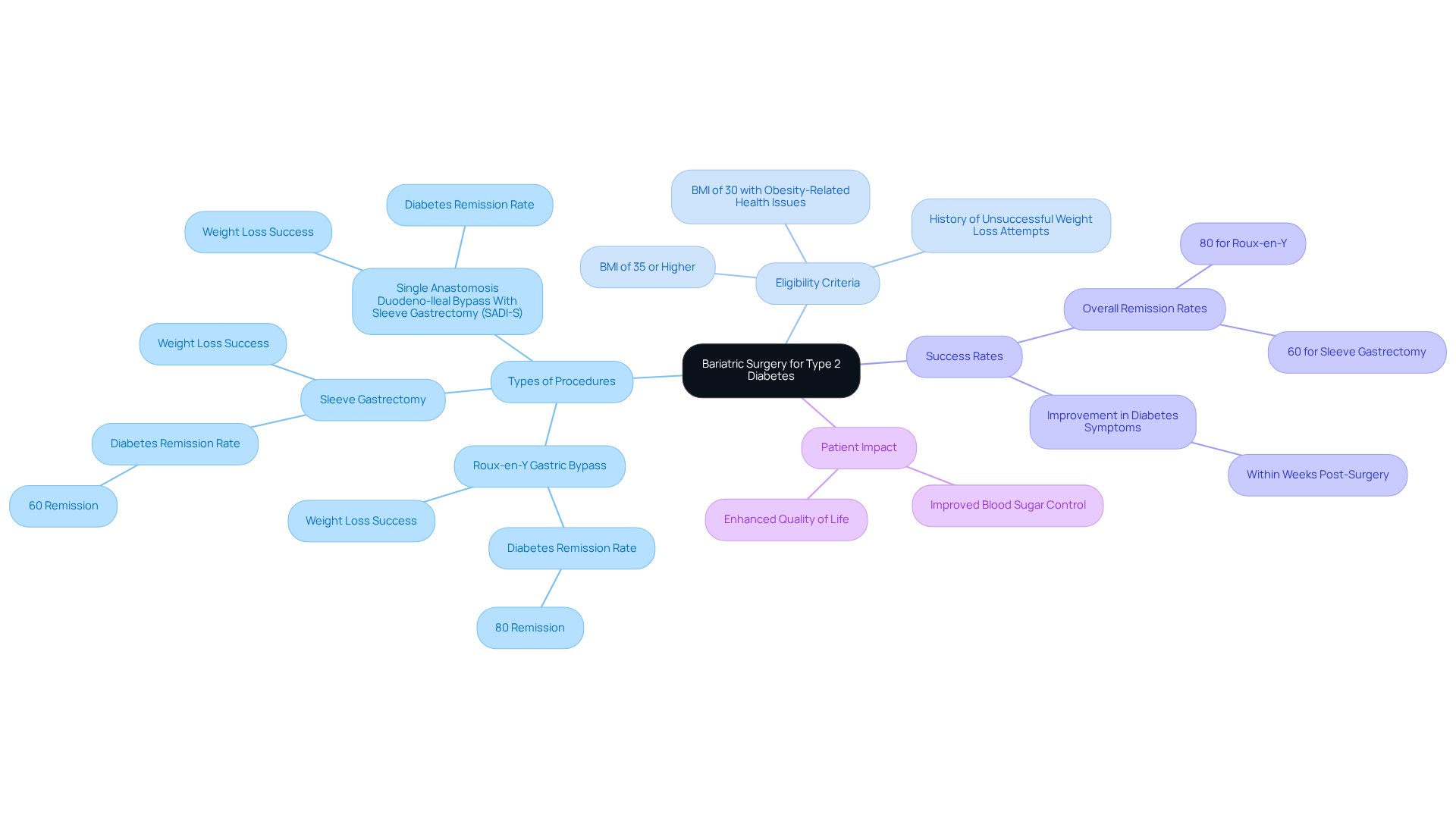
Community-Based Interventions: Local Support for Diabetes Management
Interventions for type 2 diabetes are essential for individuals managing their condition within the community. They offer a range of support mechanisms, including:
- Local support groups
- Educational workshops
- Fitness classes tailored to specific needs
These programs create connections among participants, enhancing motivation and accountability in their diabetes management journey.
Engaging with local resources not only provides practical assistance but also fosters a sense of belonging, which is vital for emotional well-being. It's understandable to feel overwhelmed, but support groups can significantly improve health outcomes by facilitating shared experiences and knowledge. Members can learn from each other's challenges and successes, creating a nurturing environment.
Experts emphasize that these local support systems can lead to sustained improvements in key health indicators, such as HbA1c levels and overall quality of life. By participating in interventions for type 2 diabetes, individuals can access valuable resources and build a supportive network. Remember, you're not alone in this journey; we are here to support you every step of the way. Taking that first step can empower you to take charge of your health effectively.
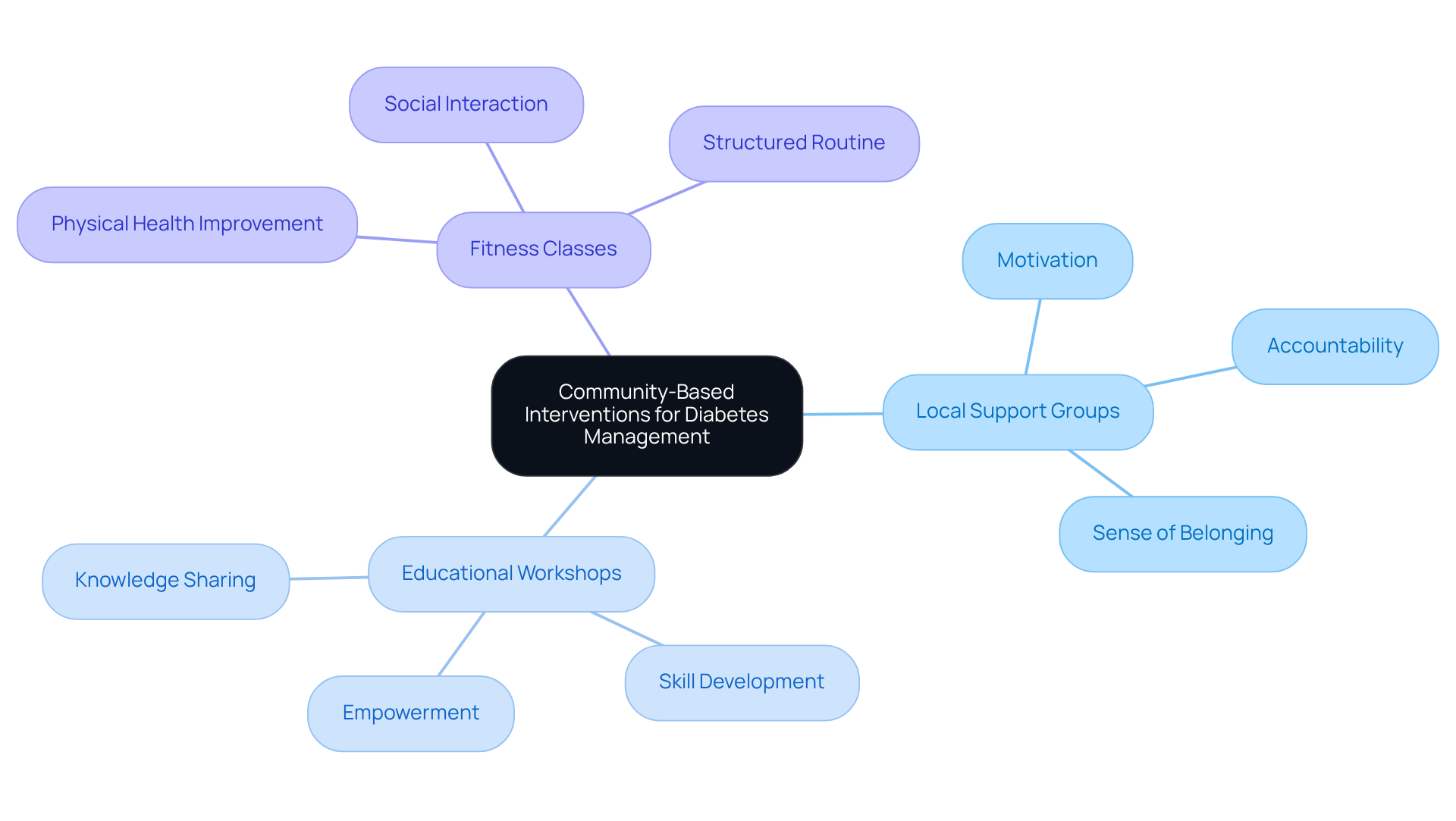
Conclusion
Managing Type 2 Diabetes can be a daunting journey, but it's important to know that you're not alone. T2DSolutions stands as a vital ally, providing a range of tailored interventions—educational resources, community support, and evidence-based guidelines—that empower you to take charge of your health. The focus on personalized care and shared experiences creates a nurturing environment, essential for achieving better health outcomes.
Throughout this article, we've highlighted key strategies for managing Type 2 Diabetes. Effective education programs, lifestyle interventions like the Diabetes Prevention Program, and medications such as Metformin play significant roles in your journey. Community-based resources and support systems enhance motivation and accountability, leading to lasting improvements in your health indicators. Insights from the Look AHEAD study and recommendations from the American Diabetes Association underscore the importance of a comprehensive approach to diabetes management.
As you reflect on your own journey, remember that support is readily available. Engaging with resources like T2DSolutions, participating in community programs, and utilizing educational materials can profoundly impact your health outcomes. Empowerment through knowledge and a strong support network not only enhances your individual management but also fosters a sense of belonging in this shared journey of health. Taking proactive steps today can pave the way for a healthier future, making it essential to explore the interventions and resources available for effective diabetes care.
Frequently Asked Questions
What is T2DSolutions?
T2DSolutions is a comprehensive resource designed for individuals managing Type 2 Diabetes, offering tailored interventions, dietary plans, exercise routines, and community support to simplify health management.
How does T2DSolutions support individuals with Type 2 Diabetes?
T2DSolutions provides practical insights, education programs like CP-HELP, and community engagement to empower individuals with the tools needed for effective self-management and improved health outcomes.
What role does community support play in managing Type 2 Diabetes?
Community support is crucial as it fosters shared experiences and knowledge, leading to better health outcomes and lower odds of emergency department visits for participants in community health programs.
What are the key guidelines provided by the American Diabetes Association (ADA) for diabetes management?
The ADA provides evidence-based guidelines that focus on nutrition, physical activity, medication management, and personalized care to enhance health outcomes for individuals with Type 2 Diabetes.
What are the ADA's recommendations regarding insulin and glucose-reducing treatments?
The ADA recommends starting or increasing insulin and other glucose-reducing treatments for most noncritically ill patients, aiming for a target glycemic goal of 100-180 mg/dL (5.6-10.0 mmol/L).
How does diabetes self-management education contribute to effective diabetes care?
Consistent diabetes self-management education ensures individuals actively engage in their care, making it culturally appropriate and responsive to enhance its effectiveness.
What is the Diabetes Prevention Program (DPP)?
The DPP is a structured lifestyle change intervention aimed at individuals at high risk for Type 2 Diabetes, focusing on weight loss through dietary modifications and increased physical activity.
What are the expected outcomes for participants in the DPP?
Participants in the DPP experience significant weight loss and a 58% reduction in the occurrence of diabetes-related conditions, along with improved insulin sensitivity and lower fasting plasma glucose levels.
How does T2DSolutions enhance the Diabetes Prevention Program?
T2DSolutions enhances the DPP by providing extensive resources and support for newly diagnosed individuals, ensuring they have access to the necessary tools for effective health oversight.
Why is weight reduction important for individuals with Type 2 Diabetes?
Weight reduction of at least 3-7% is vital for effective blood sugar control and is a key component of interventions for Type 2 Diabetes, as highlighted by the ADA.



